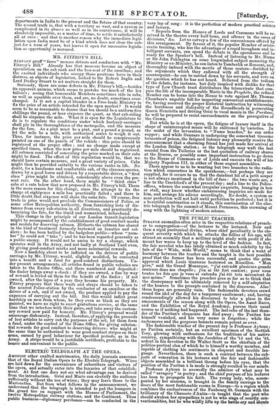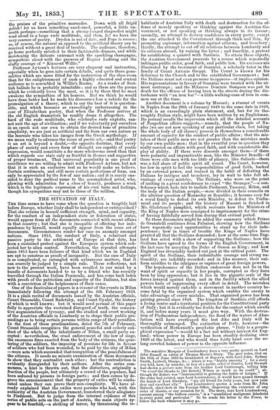THE PUBLIC TEACHER.
STRANGE anomalies often arise in the respective relations of preach- er to congregation—of the lecturer to the lectured. Now and then a rigid puritanical divine, whose chief peculiarity is the elo- quent severity with which he attacks the follies of his age, will attract an assembly that a milliner might study with profit if she meant her wares to keep up to the level of the fashion. In fact, the fair novelist who has lately obtained so much celebrity by the tale of the "Wide, wide World," seems to think that a want of harmony between the teacher and the taught is the best possible proof that the former has been successful, and quotes the grim approval which Louis Quatorze bestowed on Massillon. "Mon pere," said the Grand Monarque, " j'ai entende plusienrs grands orateurs clans ma chapelle ; j'en ai ete fort content; pour vous
toutes lea fois que je yens ai entendu ete tres mecontent de moi-meme." Sometimes the preacher goes so far as to think that the discrepancy will be ultimately removed by a self-adaptation of the hearers to the precepts contained in the discourse. Alas! those hopes are generally vain. The fashionable devotees crowd round the idol of the day for a temporary excitement ; and, having condescendingly allowed his discourses to take a place in the amusements of the season along with the Opera, the Ascot Races, and the Exhibition of the Royal Academy, pursue their usual course as if nothing had happened. The last echo of the last thun- der of the Puritan's eloquence has died away ; the Puritan has himself vanished, and his very name is forgotten ; while the cachemeres and the gorgeous bonnets remain potent as ever. The fashionable teacher of the present day is Professor Aytotui; no Puritan certainly, but an excellent specimen of the Scottish Tory, glowing with enthusiasm for the traditions of his native country, sympathizing with the Jacobites of the '15 and the '45, ardent in his devotion to Sir Walter Scott as the chieftain of the politico-poetical clan of which he is himself a worthy member, and capable of clothing his sentiments in eloquent and forcible lan- guage. Nevertheless, there is such a contrast between the sub- jects of veneration in his lectures and the fair and fashionable objects assembled in a brilliant throng before his eyes, that the position of the Puritan a la mode is strongly recalled to our minds.
Professor Aytoun is avowedly the admirer of what may be called " savagery " in poetry ; and the chief purpose of his lectures has been to propagate his faith. The young lady, who, accom- panied by her mamma, is brought in the family carriage to the doors of the most fashionable rooms in Europe—to a region which combines the exclusiveness of the Faubourg St. Germain with the brilliancy of the Chaussee d'Antin—is taught that the poet who should awaken her sympathies is not he who sings of.courtly con- ventionalities, but he who wildly lifts up the battle-ory and chats
the praises of the primitive marauder. Down with all frigid P°lis •
h I let us have something unadorned, powerful, a little un- couth perhaps—something that a strong-lunged rhapsodist might read aloud to a large rude multitude, and then, lo! we have the very essence of poetry. Dryden is out of date, and Pope is rococo ; so, of course, the natural as opposed to the artificial theory can be received without a great deal of trouble. The audience, therefore, go home perfectly satisfied to their fashionable dinners, and while moistening the delicate entremet with the sparkling champagne, sympathize aloud with the prowess of Regner Lodbrog and the crafty courage of " Kinmont Willie." Professor Aytoun's lectures are very eloquent and instructive, especially when he goes into certain details, and quits those gene- ralities which are more fitted for the instruction of the class-room than for the enlightenment of such a highly educated and central audience as is assembled in Willis's Rooms. As a reader of Scot- tish ballads he is probably inimitable ; and as these are the poems which he evidently loves the most, so it is by these that he most awakens the sympathies of his hearers. But we think he would have done better had he made his discourses less a vehicle for the promulgation of a theory, which to say the best of it is question- able, and which becomes so exceedingly embarrassing in the case of Elizabethan poetry, that when the Professor arrives at the old English dramatists he readily drops it altogether. The bard of the rude multitude, who celebrates rude exploits, can- not suit the age of civilization ; and if we voluntarily put ourselves in an epoch not our own to obtain the desired tone of primitive simplicity, we are just as artificial and far from our own nature as the laureate who takes his images from the Greek mythology. If we mean really to advance the cause of poetic art,—and that poetry is an art is beyond a doubt,—the opposite doctrine, that every phase of society and every form of thought are capable of poetic expression, would constitute a far more wholesome creed than that which regards one state only as fruitful in themes and suggestive of proper treatment. That universal popularity is one proof of excellence we are willing to admit with Professor Aytoun, but not that it is such an exclusive test as he would make us believe. Certain sentiments, and still more certain perfections of form, can only be appreciated by the few of any nation; and it is surely one- sided to deny the poetical name to the accomplished artist, who, glowing with admiration for a class of beauty, produces a work which is the legitimate expression of his own taste and feelings, though his sympathies may not be those of the million.



























 Previous page
Previous page